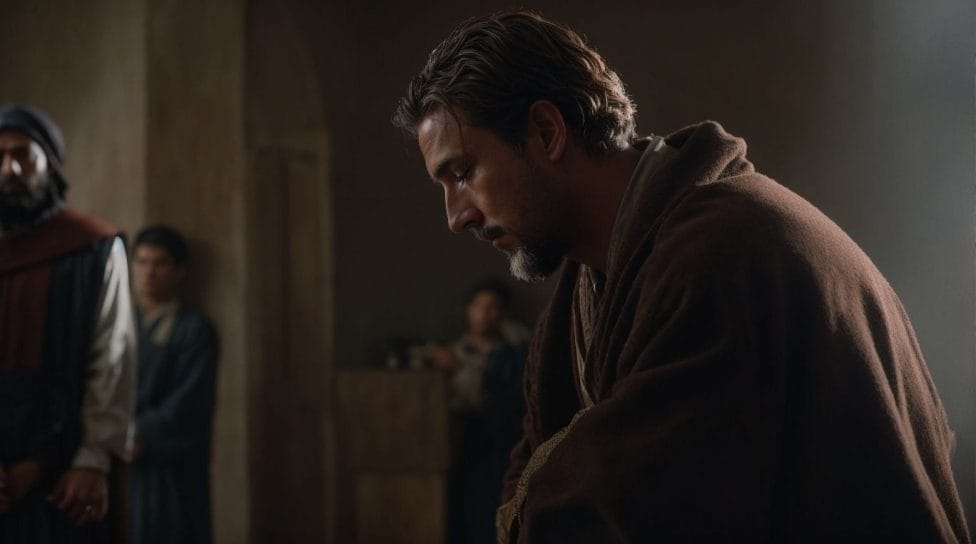The Prodigal Son Scripture is a well-known and beloved passage from the Bible found in the book of Luke, chapter 15, verses 11-32. It tells the story of a son who leaves his home, squanders his inheritance, and then returns to a loving and forgiving father.
The Parable of the Prodigal Son is one of Jesus’ many teachings and is a part of a series of parables in Luke 15 that emphasize the love and mercy of God. In the parable, a father has two sons, and the younger one asks for his share of the inheritance before his father’s death. He then goes to a distant country and wastes all his money on reckless living. When he becomes destitute and desperate, he returns to his father’s house, where he is welcomed with open arms and a grand celebration.
The context of this parable is crucial to understanding its significance. The religious leaders of the time criticized Jesus for welcoming sinners and eating with them. In response, Jesus tells this parable to show that God rejoices when a lost soul returns to Him, just as the father rejoiced when his lost son returned.
The Prodigal Son Scripture is rich with meaning and symbolism. The father represents God and his unconditional love and mercy. The younger son represents the lost and broken who wander away from God, while the older son symbolizes those who are self-righteous and resentful towards sinners. The parable also teaches valuable lessons about humility, forgiveness, and redemption.
We can apply the Prodigal Son Scripture in our lives by learning to forgive like the father, avoiding the mistakes of the younger son, and embracing the love and mercy of God. Other scriptures that relate to the Prodigal Son include the parables of the Lost Sheep, the Lost Coin, and the Unforgiving Servant, all emphasizing the importance of God’s love and forgiveness for those who are lost.
Key Takeaways:
- The Prodigal Son Scripture is a parable from the Bible that teaches about the love, mercy, and forgiveness of God.
- The parable uses symbolism and relatable characters to convey a powerful message about redemption and forgiveness.
- By understanding the lessons and applying them in our lives, we can learn to forgive, avoid mistakes, and embrace the love and mercy of God.
What is the Prodigal Son Scripture?

Photo Credits: 777Legion.Com by Nathan Nguyen
The Prodigal Son Scripture is a parable found in the Gospel of Luke (15:11-32) in the Bible. It recounts the story of a son who requests his inheritance, wastes it, and eventually returns to his father, who lovingly embraces him. This parable serves as an example of forgiveness, redemption, and the limitless love of God.
What is the Parable of the Prodigal Son?

Photo Credits: 777Legion.Com by Brian Harris
The Parable of the Prodigal Son, found in the book of Luke, tells the story of a father’s love and forgiveness towards his wayward son. This powerful parable conveys a message of repentance, forgiveness, and the endless mercy of God. It serves as a reminder of the significance of forgiveness and the happiness that comes with reconciliation.
What is the Context of the Parable?
The context of the parable of the Prodigal Son centers around Jesus addressing the grumbling of the Pharisees and scribes, who were discontent with Jesus receiving sinners and eating with them. This parable was shared to illustrate God’s immense joy and love when a sinner repents. It emphasizes the importance of forgiveness and the celebration of redemption.
Fact: The parable of the Prodigal Son is also known as the parable of the Forgiving Father.
What is the Meaning of the Prodigal Son Scripture?

Photo Credits: 777Legion.Com by Douglas Williams
The parable of the prodigal son, found in the book of Luke in the Bible, depicts the tale of a rebellious son who wastes his inheritance but is ultimately welcomed back by his merciful father. This story exemplifies the themes of redemption, forgiveness, and the unconditional love of a parent. It emphasizes the notion that no matter how far one may stray, there is always a chance for repentance and reconciliation.
What is the Symbolism of the Father?
The father in the Prodigal Son parable symbolizes unconditional love, forgiveness, and compassion. His willingness to embrace the wayward son reflects God’s boundless mercy and grace towards humanity.
Fact: The father’s actions depict the concept of divine forgiveness and acceptance, showcasing the overarching theme of redemption in the parable.
The father’s symbolism represents the idea of unconditional love and forgiveness, highlighting the theme of redemption in the parable.
What is the Significance of the Younger Son?
The significance of the younger son is found in his rebellion, repentance, and the father’s forgiveness, which reflects both divine mercy and human fallibility. Through his actions, he exemplifies universal themes of independence, remorse, and redemption, which can resonate with individuals seeking forgiveness and a new beginning.
What Lessons Can We Learn from the Prodigal Son?
What Lessons Can We Learn from the Prodigal Son?
The parable of the Prodigal Son teaches us important lessons such as:
- The significance of forgiveness and reconciliation.
- The consequences of reckless living.
- The unconditional love and mercy of God.
- It also emphasizes the value of humility, repentance, and showing compassion towards those who have made mistakes.
How Can We Apply the Prodigal Son Scripture in Our Lives?

Photo Credits: 777Legion.Com by Paul Martinez
- Reflection: Contemplate on personal behaviors resembling the prodigal son’s actions.
- Repentance: Acknowledge past mistakes and seek forgiveness.
- Forgiveness: Forgive oneself and others for past wrongdoings.
- Gratitude: Appreciate second chances and express gratitude for blessings.
- Humility: Embrace humility and learn from past experiences.
By applying the prodigal son scripture in our lives, we can cultivate a spirit of reflection, repentance, forgiveness, gratitude, and humility, fostering personal growth and spiritual development.
How Can We Apply the Prodigal Son Scripture in Our Lives?
How Can We Learn to Forgive Like the Father?
- Reflect on the Father’s forgiveness: Contemplate the unconditional and boundless nature of the father’s forgiveness, and how we can learn to forgive like him.
- Practice empathy: Seek to understand the perspectives and experiences of those who have wronged you, and how this can help us forgive like the father.
- Release resentment: Let go of negative emotions and animosity towards the transgressor, and learn to forgive as the father did.
- Cultivate compassion: Foster a mindset of mercy and benevolence towards others, mirroring the father’s compassion and learning to forgive like him.
- Embrace reconciliation: Be open to reconciling with the offender, extending forgiveness as the father did and showing forgiveness like him.
How Can We Avoid the Mistakes of the Younger Son?
Recognize the consequences of impulsive decisions.
Practice humility and acknowledge mistakes.
Value family and seek reconciliation.
Embrace responsibility and hard work.
A young man, inspired by the Prodigal Son’s parable, learned from his mistakes and mended his relationship with his estranged father by expressing remorse and committing to making amends. Through consistent effort and humility, he was able to rebuild trust and restore family bonds.
How Can We Embrace the Love and Mercy of God?
- Recognize your faults and seek forgiveness through prayer and reflection.
- Study and meditate on scriptures that emphasize God’s love and mercy, such as the story of the Prodigal Son.
- Practice gratitude and compassion towards others, mirroring God’s love and mercy in your actions.
- Seek reconciliation with those you have wronged and forgive those who have wronged you.
To truly embrace the love and mercy of God, it is important to foster a spirit of forgiveness, gratitude, and reflection in our daily lives.
What Other Scriptures Relate to the Prodigal Son?

Photo Credits: 777Legion.Com by Brian WilsonThe parable of the Prodigal Son is a well-known and beloved story from the Bible that teaches about forgiveness and redemption. However, there are other scriptures that also touch upon these themes and further deepen our understanding of the Prodigal Son. In this section, we will explore three other parables – the Lost Sheep, the Lost Coin, and the Unforgiving Servant – and how they relate to the story of the Prodigal Son. Each parable offers a unique perspective on forgiveness and the love of God towards his lost children.
The story of the lost sheep teaches valuable lessons through the following steps: To apply the teachings of this scripture, we should strive to seek, find, and rejoice in restoring those who are lost. Pro-tip: Just as the woman diligently searched for the lost coin, we should also persistently reach out to those who are spiritually lost.1. The Lost Sheep
2. The Lost Coin
3. The Unforgiving Servant


